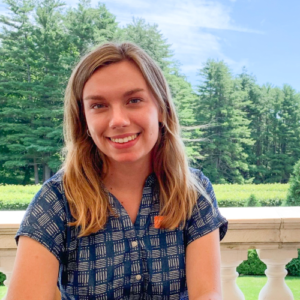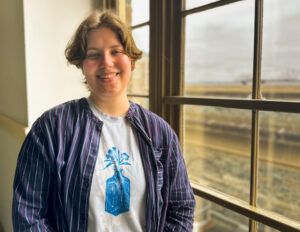Lucy Boyd
 Lucy Boyd always knew she wanted to study history and literature, but coming out of high school, the Ottawa, Ont. native wasn’t sure of the specifics. In this way, the broad overview offered by King’s’ Foundation Year Program (FYP) seemed ideal. Boyd travelled to Halifax to visit the school and said sitting in on a lecture “sealed the deal.” In this way, the broad overview offered by King’s’ Foundation Year Program seemed ideal.
Lucy Boyd always knew she wanted to study history and literature, but coming out of high school, the Ottawa, Ont. native wasn’t sure of the specifics. In this way, the broad overview offered by King’s’ Foundation Year Program (FYP) seemed ideal. Boyd travelled to Halifax to visit the school and said sitting in on a lecture “sealed the deal.” In this way, the broad overview offered by King’s’ Foundation Year Program seemed ideal.
“The students were so engaged, and everyone was so welcoming,” Boyd says. “I just sort of realized that I could really see myself having a future at King’s.”
During her time at King’s, Boyd served as president of the UKing’s Literary Society and was involved with the Counter Memory Activism research group, which explores the historical context around collective memory. In both roles, she helped plan and pull off large-scale events, which pushed her out of her comfort zone and allowed her to connect with others who shared her interests. Helping plan and host poetry readings as part of the Literary Society was a highlight.
“I’m really passionate about the arts, and the big idea with live poets was bringing writers and readers together … giving contemporary Canadian authors a platform at King’s and the chance to interact with students,” she says.
At the end of Boyd’s second year, the pandemic pushed everything online. She said the experience was draining, but it made her even more grateful for choosing King’s. “I had friends at larger schools who, once they were off campus, the points of access that helped them navigate a larger institution were taken away,” she explains. “Because King’s is small, and Early Modern Studies is a really tiny program, I still was able to maintain a sense of connection with my classmates and with my teachers.”
And it is this support and encouragement from her professors that Boyd attributes to the success of her thesis project. Boyd said she wanted to find a way to explore the intersection of women and religion from a historical perspective and found herself immersed in the writings of Renaissance nuns. Boyd ultimately chose to examine how monastic life gave these women opportunities for spiritual and artistic expression they might not have experienced otherwise, focusing on the experience of Disabled women in convents. Though the project initially felt daunting, Boyd said working within a close-knit support system helped her push through the “bumps,” and her confidence has grown immeasurably.
“It’s really fulfilling to know that you can take on a project of that magnitude, and being pushed to do tough things is great,” she says. “I used to have a really hard time in the Foundation Year Program. Writing five pages was a herculean labour, and if you sat me down right now, I could probably do it in one sitting. So I think that’s a sign of growth.”
Boyd will return to her hometown this fall to begin a master’s degree in public history at Carleton University. She eventually hopes to work in a cultural institution.
Her advice to incoming students? Be open to trying new things, trust your intuition, and don’t stress if it takes a little while to settle in.
“Sometimes, in the moment, it’s hard to know where you’re going, but you just have to sort of trust in yourself and believe that the right thing will work itself out in the end,” she says. “It’s all very overwhelming at first, but you will be able to look back on that moment and see how far you’ve come, and that’s very rewarding.”
“The students were so engaged, and everyone was so welcoming. I just sort of realized that I could really see myself having a future at King’s.”
Elsy Rytter
 Elsy Rytter thought she would study archeology at Simon Fraser—until a recruiter from King’s mentioned the French Revolution and classical studies … also, there was the FYP reading list. As someone obsessed with mythology and ancient civilizations growing up, Rytter didn’t realize she could get a degree in the subjects she read about for fun. “I didn’t know they could have such specific programs,” she says. “I was so excited.”
Elsy Rytter thought she would study archeology at Simon Fraser—until a recruiter from King’s mentioned the French Revolution and classical studies … also, there was the FYP reading list. As someone obsessed with mythology and ancient civilizations growing up, Rytter didn’t realize she could get a degree in the subjects she read about for fun. “I didn’t know they could have such specific programs,” she says. “I was so excited.”
Making the most of what King’s had to offer, Rytter completed a combined honours in Early Modern Studies and Classics, with a certificate in Art History—and took every fashion history course offered by Dalhousie. She sought to combine these passions in her thesis project by exploring how the political and social climate influenced and changed men’s dress.
“There’s this general theory in dress history called the ‘great renunciation’ that after the revolution, men no longer engaged with fashion in a frivolous or meaningful or beautiful way,” she explains. “So I argued against that using three major figures.”
Rytter says she’s been in a state of shock since submitting her project.
“To remain so focused on something for so long, it’s very hard,” she says. “I feel … kind of numb. It has not set in yet [that I wrote] a 50-page paper!”
“I was able to make a community for myself here … I’m so grateful to have had that and found that through King’s.”
Rytter was part of the school’s acapella choir and the Early Modern Studies student society. She also co-directed a production of Euripides’ The Bacchae for this year’s Classics in the Quad. Putting on the play was a highlight of her time at King’s, and she laughs thinking back to it because what was supposed to be a Greek tragedy somehow turned into a comedy midway through the production.
“We directed it to be very serious because it’s a serious play, but as the audience watched it, they thought it was so funny that the cast switched to make it really comedic,” she laughs. “Then, at the end, when things become extremely tragic and very violent, it was as though the hammer fell. It was very strange.”
During the pandemic, Rytter moved back to B.C., and while she said getting up for the 4:30 a.m. classes was challenging, not having that in-person classroom dynamic was what she missed most. “In a classroom, you can look across the room at people and make eye contact and [think], ‘Ok, you are also struggling; we’re on the same page,’” she says.
After graduation, Rytter is taking a gap year to reorient and recoup after writing her thesis, then plans to revisit her original aspirations to become an archeologist. Because she is a dual citizen in Canada and Sweden, she says she would love to do her master’s overseas and work as a teacher in the longer term. Regardless of what she decides to do next, Rytter says she will miss the intimate environment at King’s.
“When is the next time I’m going to be able to walk into a room and know every single person there,” she says. “I was able to make a community for myself here. It was something I always struggled with in high school and at home … I’m so grateful to have had that and found that through King’s.”

